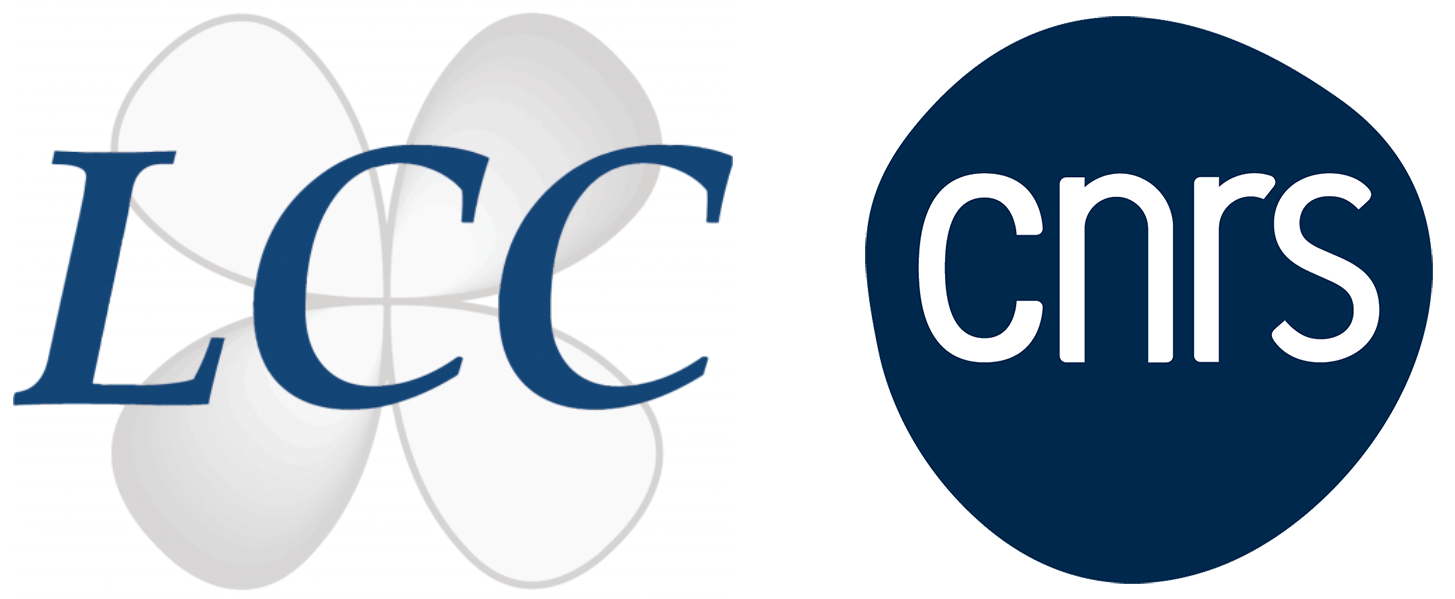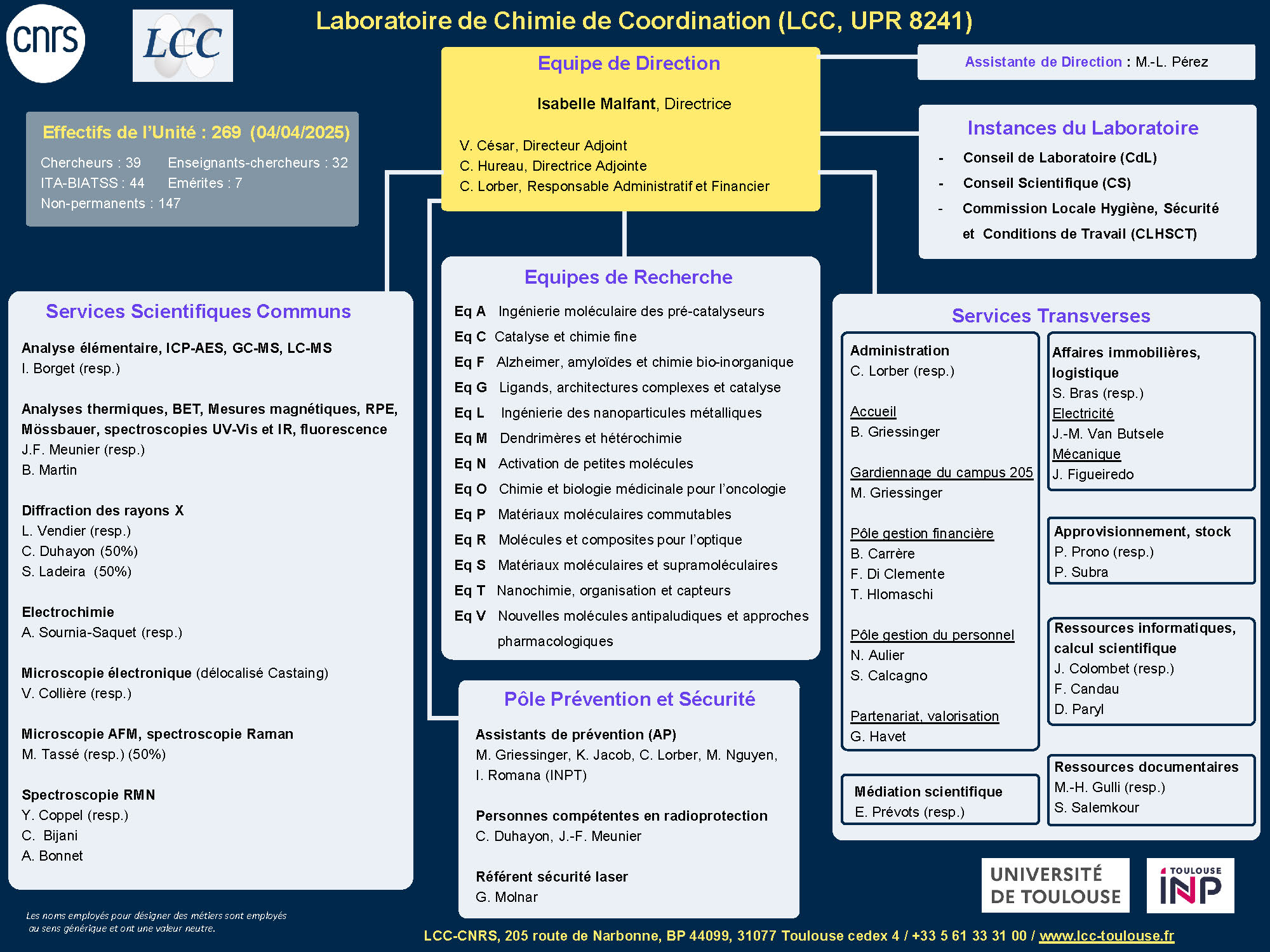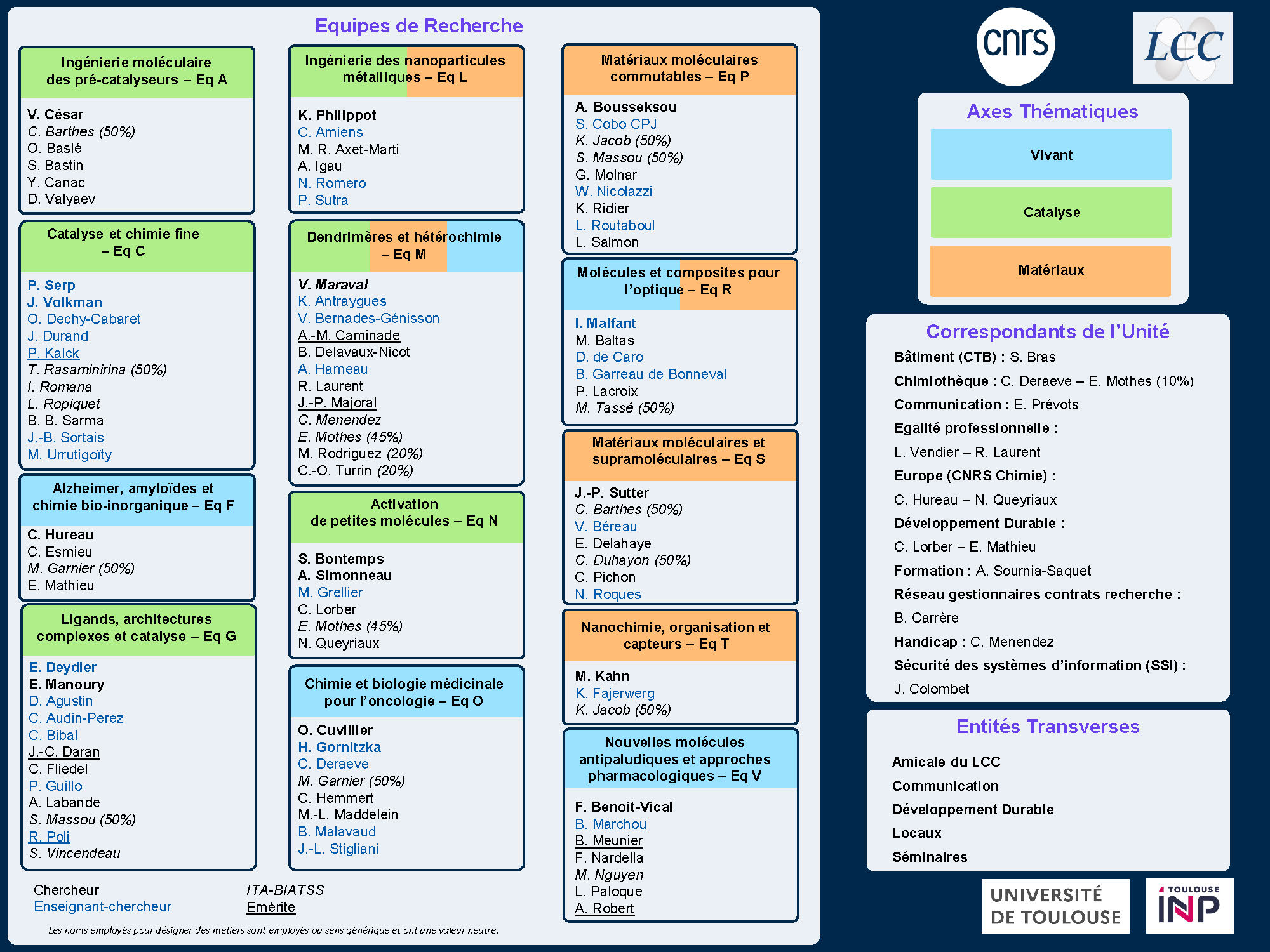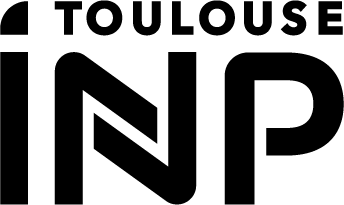LCC
Editorial from the director
The exceptional health crisis associated with the Covid pandemic marked the start of the decade. More than ever, scientific research and long periods of research are essential. In order to shine a light on progress and provide reliable scientific data to our fellow citizens, it is essential to disseminate the results of research carried out in laboratories.
At a time when more and more professional activities, such as meetings and teaching, are being done remotely, we felt it was necessary to disseminate the results of the coordination chemistry laboratory’s (LCC) research via this new website.
The central theme underlying the laboratory’s scientific policy is synthesis and reactivity in coordination chemistry and heterochemistry, a theme around which the LCC’s research is organized into three thematic axes: catalysis, health, and materials.
Recent scientific results obtained in the laboratory demonstrate the extent and depth of the research conducted there. You will learn about the development of new catalysts, the search for cures for tuberculosis and Alzheimer’s disease, and the importance of spin transition materials in the development of flexible actuators for robotics and artificial muscle!
The Toulouse Coordination Chemistry Laboratory (LCC) is a CNRS Own Unit founded in 1974, which operates as a real Institute. It is constituted to date of 13 research teams, and administrative, scientific, and technical services of great value.
The LCC develops training actions through research, by welcoming students from different doctoral schools, completing doctorates, welcoming post-docs, and updating knowledge and techniques for application in industry and public research institutions.
The promotion of the research carried out at the LCC results in the strengthening of its industrial relations (research contracts with industry, particularly with SMEs and SMIs), but it also results in the formation of various start-ups founded by lab staff.
The LCC’s well-established national and international influence is attested to by the strengthening of contractual connections with regional public bodies (Regional Council), with other research centers (European networks: LEA, LIA, GDRI, ETN, etc.), and through various cooperation agreements with the CNRS, the Ministry of Higher Education, Research and Innovation, and the Ministry of Europe and Foreign Affairs.
The NANOMAT Regional Research and Innovation Platforms (PPRI) initiative launched in 2021 permitted to expand the laboratory’s X-ray diffraction and electron microscopy department through the implementation of X-ray diffraction under pressure, which is exclusive to the Toulouse site.
Another noteworthy project is the third-year-old “Innovative Training Network,” the main PhD training program created by the European Commission. Five of the fifteen PhD students in the program, for whom the laboratory is in charge of overall supervision, were welcomed by the LCC in this environment.
The success of one of the laboratory teams at the ERC “Advanced Grant” attests to the recognition of the LCC at the international level.
The LCC-BAT-INNOV project will also be arbitrated in 2022-2023, and we anticipate positive results. This project will strengthen the laboratory’s research and innovation, making the LCC not only a CNRS flagship laboratory in coordination chemistry , but also laying the foundations for a new concept “innovation at the heart of the laboratory” in the image of major international structures.
I hope you enjoy your reading. I would like to express my sincere gratitude to the LCC staff members who work hard every day to advance research.
Azzedine Bousseksou
Key figures
Employees
Publications/year
PhD defenses/year
Patents/year
Prizes/year
International laboratoiries
International scientific cooperation projects
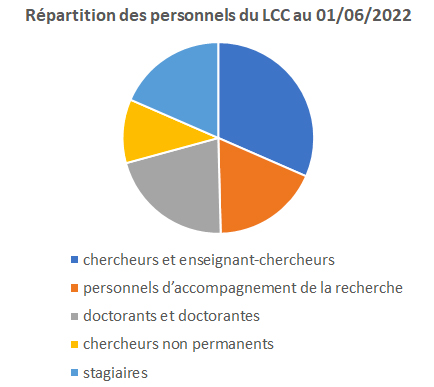
Research areas
Synthesis and reactivity in coordination and heterochemistry is the core scientific theme that drives the laboratory’s policy, and it is the theme around which the LCC’s research is organized into three thematic domains at the interfaces with other fields:
Chemistry and catalysis:
Fine chemistry, coordination chemistry, and catalysis all aimed toward sustainable development (environment and energy).
Chemistry and materials:
Molecular materials at the interface with physics, nanosciences, and nanotechnologies (Quantum technologies).
Chemistry and health:
Bioinorganic chemistry and the role of metals in biology in relation to life sciences (health).
Historical
In 1974, under the impetus of Fernand Gallais, who had just been appointed a member of the French Academy of Sciences, the CNRS created its own Research Unit centered on an emerging discipline, Coordination Chemistry. Since then, 4 other academicians have been elected among the members of the LCC.
The Coordination Chemistry Laboratory (LCC) of the CNRS, UPR 8241 was created from the merger of a CNRS Associated Laboratory and several university teams working in the field of inorganic chemistry.
From its creation in 1974 until 1978, the LCC was directed by Fernand Gallais. The unit then comprised 71 permanent staff (35 teacher-researchers, 13 CNRS researchers, 15 ITA, 8 ITAOS). Initially centered on the study of the electronic nature of the coordination bond, the research themes gradually evolved towards the study of the reactivity of complexes then moved towards organometallic chemistry under the direction of René Poilblanc (1979-1985).
In 1979 Bernard Meunier joined the LCC and initiated the coordination chemistry / biology rapprochement.
The arrival of Igor Tkatchenko as director in 1986 made homogeneous catalysis emerge as one of the most important themes of the laboratory. At the same time, the 1980s saw, notably under the impetus of Patrick Cassoux, the development of molecular materials, another strong theme for the laboratory, with the obtaining of a first molecular superconductor.
At the end of the 1980s, the chemistry building fire at the University of Toulouse III-Paul Sabatier (UPS) led the surrounding laboratories to welcome the affected teams. This event strengthened the interconnection of the Toulouse chemical laboratories and is certainly no stranger to the emergence of a federation structuring the local community of chemists. This is particularly true for the LCC which hosts the teams of Jean-Pierre Majoral, Guy Bertrand and Max Koenig.
The first team remained at the LCC permanently where Jean-Pierre Majoral started his theme on dendrimers with Anne-Marie Caminade. The second temporarily for Guy Bertrand, who is developing carbene chemistry before crossing the Narbonne road and then the Atlantic. The LCC is further enriched by a new determining theme: the chemistry of hetero-elements.
In the early 1990s, under the direction of Gilbert Balavoine (1994-1998), asymmetric catalysis and the chemistry of nanoparticles emerged as key themes in the laboratory. The LCC then took its first steps in microelectronics.
Jean-Jacques Bonnet’s mandate (1998-2006) has undergone many changes. It first saw the extension of the LCC and its partial rehabilitation, which were only completed in 2008.
The arrival of the teams of Peter Faller and Rinaldo Poli then made it possible to strengthen the themes of chemistry / biology and organometallic chemistry and catalysis, respectively. The creation of a new team on switchable molecular materials around Azzedine Bousseksou and the arrival of Jean-Pascal Sutter in the Molecular, Supramolecular and Biomimetic Materials team come to consolidate the Chemistry / Materials axis. The teams of Sylviane Sabo-Etienne and Michel Etienne have also been set up with an orientation towards the activation of small molecules.
During this same period, a team from the LCC participated in the creation of a new laboratory: the Laboratory of Physics and Chemistry of Nano-Objects (LPCNO) within the Department of Engineering Physics of INSA, and the LCC hosted the team of Jean-François Nierengarten (2005-2007) on themes at the frontier of supramolecular chemistry and molecular materials, while Bernard Meunier left the laboratory for the Presidency of the CNRS then for the company Palumed which he created in 2000.
Under the direction of Bruno Chaudret (2007-2010), Philippe Kalck’s team (now led by Philippe Serp and Maryse Gouygou) is attached to the laboratory while remaining located at the ENSIACET of the National Polytechnic Institute of Toulouse (INPT). Chemists from the IUT of Castres are also successfully integrating, within the team led by Jean-Pascal Sutter for one and within the team led by Rinaldo Poli and Eric Manoury for the others. The latter are continuing their research work on the Castres site.
The handover from Bruno Chaudret to the new management of the LCC (Neibecker/Bousseksou) took place on January 1, 2011. This step was accompanied by the departure of Bruno Chaudret to the LPCNO. Since January 2013, Azzedine Bousseksou has been Director of the LCC with successively Deputy Director Denis Neibecker, Noël Lugan, and Eric Manoury together with Anne-Marie Caminade (2021).
Since then, the health axis has been greatly strengthened with the involvement of 5 of the 13 teams of the Laboratory. The LCC obtained the provision of IPBS premises for an activity at the interface of Chemistry and Health for the team led by Françoise Benoit-Vical (DR INSERM and member of the LCC). This axis has also been successful at the ERC: “starting grant” project led by Christelle Hureau.
The Materials axis was consolidated by the creation of two new teams (the team led by Isabelle Malfant on Materials for Optics and the team led by Myrtil Kahn on nanoparticles for physico-chemical sensors) and the arrival in transfer of a researcher (Emilie Delahaye) and a lecturer from Strasbourg (Lucie Routaboul). The E-MOTION project led by Azzedine Bousseksou from the LCC’s switchable molecular materials team is one of the 14 CNRS winners of the ERC “Advanced” call 2020.
The Catalysis axis has also been enriched by the arrival of a new university professor (position assigned to the LCC by Paul Sabatier University). This is Jean-Baptiste Sortais, laureate of the chair of excellence of the University of Rennes). And also the transfer of a CNRS researcher from Rennes (Olivier Baslé) as well as a success for an ERC “starting grant” project led by Antoine Simonneau (CR, CNRS).
Since its creation, the LCC has therefore experienced a number of integrations or spin-offs, a real openness in both directions which has helped to develop its themes without calling into question its dynamics and creativity. It was able to adapt without damage to these external stimuli while maintaining a coherent and visible orientation centered on synthesis and reactivity in coordination chemistry and heterochemistry.
LCC
Laboratoire de chimie de coordination du CNRS
205 route de Narbonne, BP 44099
31077 Toulouse cedex 4
France
